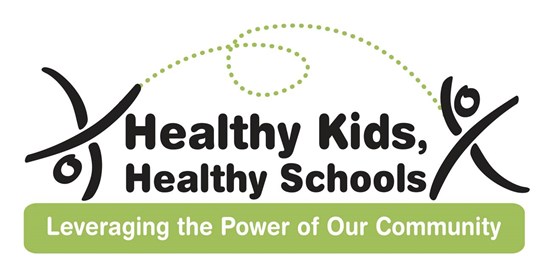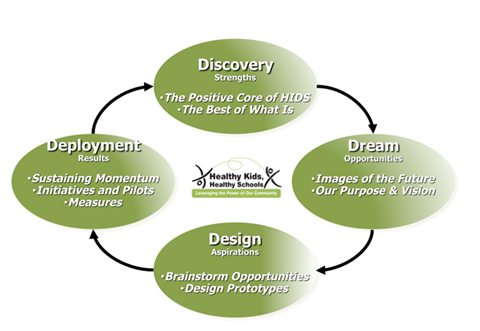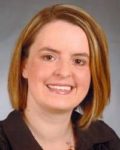Healthy Kids Healthy Schools
Healthy Kids, Healthy Schools: Leveraging the Power of Our Community
A Project with Houston Schools and DairyMAX
Description of the Summit:
There are few, if any, more urgent health risks facing our community than the current epidemic of overweight and obesity in our society, especially for our K-12 school children. This issue impacts every state, especially Texas. According to a study by the Texas Department of Health and the Centers for Disease Control and Prevention, about one-third of our state’s children are either obese or overweight. With the aim of supercharging efforts to enhance wellness within the Houston Independent School District (HISD), the Houston community came together in an innovative way Feb 20 -21, 2009. With their Healthy Kids, Healthy Schools Summit, they engaged a broad range of stakeholders in an historic gathering designed to chart a new course leading toward a healthier generation of Houstonians. Designed as a national model, this initiative was sponsored in part by the National Dairy Council and Dairy MAX in full partnership with HISD and partners such as the Houston Texans, STEPS Healthier Houston-Harris County Consortium, and Houston Can Do. Dr. David Cooperrider and Dr. Lindsey Godwin helped facilitate the event using an Appreciative Inquiry model that allowed representatives of the ‘whole system’ to collaborate in an innovative, interactive way to develop solutions to this issue by building on the existing strengths of HISD.

Take a look at some of the materials used in our Summit
- HKHS Workbook (725.17 KB)
- Summit Tasks and Objectives (81.54 KB)
Additional Web Resources
What is an Appreciative Inquiry Summit?
This is not your typical planning meeting!
- The WHOLE SYSTEM participates–a cross-section of as many internal and external stakeholders as possible–people and groups that care about and have a stake in the future of our school system. This means more diversity and less hierarchy than is usual in a working meeting, and a chance for each person and stakeholder group to be heard and to learn other ways of looking at the task at hand.
- TASK FOCUSED–a summit is task focused, not simply an educational event or a conference. We are here to accomplish the task of building our vision and plan of action for becoming a high empowerment school district in ways that will accomplish our summit task–to create healthy kids and healthy schools across Houston by leveraging all the strengths and talents that exist within our community.
- Future scenarios are put into HISTORICAL and GLOBAL perspective. That means thinking globally together before acting locally. This enhances shared understanding and great commitment to act. It also increases the range of potential actions.
- People SELF-MANAGE their work, and use DIALOGUE and INQUIRY–not “problems-solving”–as the main tool. That means helping each other do the tasks and taking responsibility for our perceptions and actions.
- COMMON GROUND rather than “conflict management” is the frame of reference. That means honoring our difference and then discovering areas for action where we have a strong common ground.
- APPRECIATIVE INQUIRY (“AI”) — To appreciate means to value–to understand those things worth valuing. To inquire means to study, to ask questions, to search. AI is, therefore, a collaborative search to identify and understand the organization’s strengths, the greatest opportunities, and people’s aspirations and hopes for the future.
- COMMITMENT TO ACTION–Because the “whole system” is involved, it is easier to make mroe rapid decisions, and to make commitments to action in an open way that everyone can support and help make happen.
To read more about this Appreciative Inquiry Summit, please click here.
The AI 4D Cycle

Suggested Reading
- Positive Organization Development: Innovation-inspired Change in an Economy and Ecology of Strengths
- Appreciative Inquiry: A Positive Revolution in Change
- Appreciative Inquiry Handbook: For Leaders of Change
- The Appreciative Inquiry Summit: A Practitioner’s Guide for Leading Large-Group Change
- The Power of Appreciative Inquiry: A Practical Guide to Positive Change
- The Appreciative Organization
Creating Your Own Images of Healthy Schools and Healthy Kids
The Special Tasks and Significance of the Arena of School Wellness
Let’s assume that tonight, after our session, you go into a sound sleep and when you wake it is 11 years in the future — it is now 2020. But while you were asleep things have changed in wonderful ways! Several developments, both small and large, have happened that they seem like miracles, and our schools and communities have changed in ways you would most like to see. Innovative partnerships across the community are supporting wildly successful initiatives that promote health in our schools. Teachers, administrators and staff are role models of health. The curriculum in every subject has been leveraged to promote wellness for our children. Every student has a personalized health plan and excited to follow it. Healthy foods and engaging activities are readily accessible and affordable. Indeed, our schools have become world-class models of health and well-being for every student.
- Imagine that you awaken to find all these things – and more- happening. You go out into the city of Houston in 2020 and get a panoramic view of our healthy schools and community and it has become the kind of community that you most want to see. Please describe now what you see in your vision of this ideal future. Describe what is happening in 2020 that is new, changed, or better? How do you know?
- More specifically now, what do you see in your vision of the future happening within your specific organization (classroom, school, business, etc.) that is successfully promoting healthy schools and healthy kids in a new, changed, or better way? What is the evidence you see for this?
- Finish the sentence: I will be most proud of the Houston Independent School District of the future when…?
Meet the Taos Associates Responsible for this Project:
David L. Cooperrider, Ph.D.
David is the Fairmount Minerals Professor of Social Entrepreneurship at the Weatherhead School of Management, Case Western Reserve University. Professor Cooperrider is past Chair of the National Academy of Management’s OD Division and has lectured and taught at Harvard, Stanford, University of Chicago, Katholieke University in Belgium, MIT, University of Michigan, Cambridge and others. David is founder and Chair of the Center for Business as an Agent of World Benefit. David has served as advisor to a wide variety of organizations including the Boeing Corporation, Fairmount Minerals, Green Mountain Coffee Roasters, McKinsey, Parker, Sherwin Williams, Wal-Mart as well as American Red Cross, American Hospital Association, Cleveland Clinic, and World Vision. Most of the projects are inspired by the Appreciative Inquiry (AI) methodology for which Professor Cooperrider is best known. His founding theoretical work in this area is creating a positive revolution in the leadership of change; it is helping institutions all over the world discover the power of the strength-based approaches to multi-stakeholder innovation and sustainable design. David’s work has received numerous accolades; in 2000 he was recognized as among “the top ten visionaries” in the field by Training Magazine and in 2004 received ASTD’s highest award for “distinguished contribution to the field” of organizational learning. David received the 2004 Porter Award for best writing from the OD Network, and was named this year’s 2007 Faculty Pioneer for his impact in the field of sustainability by the Aspen Institute.
Lindsey N. Godwin, Ph.D.
Lindsey N. Godwin is an Assistant Professor of Management in the College of Business at Morehead State University.She holds a M.S. in Conflict Analysis and Resolution from George Mason University and a Ph.D. in Organizational Behavior from Case Western Reserve University, where she studied with the founders and leading thought-leaders in Appreciative Inquiry (AI) and served as a research associate for the Center for Business as Agent of World Benefit (B.A.W.B.). With a passion for helping organizations leverage their potential through strength-based change, Lindsey continues to help organize and facilitate AI processes with a variety of organizations. In collaboration with Dr. David Cooperrider, she designed and co-facilitates a series of online experiential workshops that focus on teaching the foundations of AI to people across the globe. She currently is a knowledge manager for the AI Commons (http://appreciativeinquiry.
case.edu), an open-source resource space for Appreciative Inquiry. She served as the Program Chair for the 2007 International Appreciative Inquiry Conference in Orlando, FL and was the Co-chair for the 2009 World Appreciative Inquiry Conference, held in Kathmandu, Nepal.


